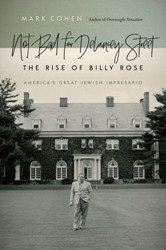Most Americans old enough to remember where they were when John F. Kennedy was assassinated are also likely to remember the advent of Allan Sherman, the pop culture phenomenon who appeared, seemingly out of nowhere, in 1962 with the release of his album of song parodies, My Son, the Folk Singer.
Mark Cohen’s lucid and illuminating biography gives satisfying answers to the most critical questions about Sherman: Where did he come from? What made him tick? What was his effect on American culture? And what happened to him after he fell from public view, almost as quickly as he rose?
Fittingly, Cohen’s account of Sherman’s family origins is difficult to follow, as Sherman’s early years could most charitably be described as chaotic. He went through numerous stepparents, last names, and hometowns before the age of seventeen, gaining a sense of self-doubt that would trigger subsequent bouts of binge drinking and eating.
Two things Sherman never doubted about himself were his comic talent and his Jewish identity, which he embraced with infectious ease and affection. When he merged these two traits, in his breakout album and its follow-up, My Son, the Celebrity, the results were both brilliant and culturally significant, giving a major boost to the growing sense in America as a whole that being Jewish was “cool.”
In Sherman’s comedic world, Jews and Jewish culture are ubiquitous, but in an open and endearing way that defangs the traditionally anti-Semitic view of a world manipulated by sinister, conspiratorial Jews lurking in the shadows. Shermanland is populated not by Machiavellian financiers but familiar and lovable deli owners, garment workers, and CPA’s. Medieval Sherwood Forest, replete with knights and dragons, is seamlessly joined with contemporary Shaker Heights; a Garment District cutter named Harry Lewis is lauded (“Glory, glory Harry Lewis!”) for his heroism in the service of “the drapes of Roth”; a gunfight breaks out in the streets of Miami between two business partners at odds over whether the firm should pay for one’s stay at the Fontainebleau; “Hava Nagila” becomes a ballad chronicling the upward mobility of an American couple named Harvey and Sheila.
Unfortunately, Sherman’s own success had a less than salutary effect on him. His career reached its peak with the release, in 1963, of “Hello Muddah, Hello Fadduh!” This single became Sherman’s best-known work, but it also suggested that the richly witty vein he had mined previously was rapidly becoming played out. While amusing and touching, the song is devoid of Jewish references, and because it is set to an orchestral piece (Ponchielli’s “Dance of the Hours”), it lacks the multilayered word-play that drives such pieces as “My Zelda,” which riffs on Harry Belafonte’s “Matilda.”
More tragically, Sherman’s success enabled him to indulge in increasingly self-destructive behavior, as he literally spent, drank, and ate himself into oblivion over the remaining years of his life and died, of a massive heart attack, ten days shy of his forty-ninth birthday.
Anyone curious about Sherman and the era in which he lived should pick up this book.




